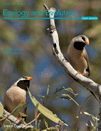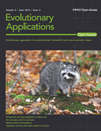
JOURNAL OF EVOLUTIONARY BIOLOGY
Scope & Guideline
Fostering Insights into Life’s Adaptive Strategies
Introduction
Aims and Scopes
- Evolutionary Mechanisms and Dynamics:
The journal emphasizes research on the mechanisms of evolution, including natural selection, genetic drift, and gene flow. It explores how these forces shape evolutionary trajectories across different species and ecological contexts. - Adaptation and Speciation:
A core area of focus includes studies on adaptation to changing environments and the processes of speciation. This encompasses both ecological and genetic perspectives, examining how populations diverge and adapt to their niches. - Genetic and Genomic Insights:
Research published in the journal often employs genetic and genomic approaches to understand evolutionary processes. This includes studies on gene expression, allelic variation, and the role of specific genes in adaptation and reproductive isolation. - Ecological Interactions and Evolution:
The journal examines the interactions between organisms and their environments, investigating how ecological dynamics influence evolutionary outcomes. This includes studies on predator-prey relationships, mutualism, and the role of microbiomes in evolution. - Behavioral Evolution:
Behavioral traits and their evolution are frequently addressed, focusing on sexual selection, mating systems, and the influence of social structures on evolutionary processes.
Trending and Emerging
- Genomic and Transcriptomic Approaches:
There is a significant increase in studies utilizing genomic and transcriptomic techniques to explore evolutionary questions. This trend underscores the importance of molecular data in understanding adaptation and evolutionary dynamics. - Climate Change and Evolution:
Research examining the impacts of climate change on evolutionary processes is on the rise. This includes studies on how species adapt to changing environments, suggesting a growing recognition of the urgency of these issues in evolutionary biology. - Microbiome and Evolutionary Interactions:
The role of microbiomes in evolution is gaining traction, with increasing publications exploring how microbial communities influence host evolution and adaptation. This emerging scope reflects a broader interest in the interconnectedness of organisms and their environments. - Behavioral Ecology and Evolutionary Psychology:
There is a noticeable trend towards integrating behavioral ecology with evolutionary biology, focusing on how behavioral traits evolve in response to ecological pressures and social dynamics. - Experimental Evolution Studies:
The journal has seen a rise in experimental evolution research, where controlled experiments are used to observe evolutionary processes in real-time. This approach provides valuable insights into adaptation and evolutionary mechanisms.
Declining or Waning
- Classic Evolutionary Theories:
Research that strictly adheres to classical evolutionary theories, such as simple models of natural selection without integrating modern genetic and ecological insights, appears to be decreasing. The journal's trend is moving towards more integrative and complex models. - Fossil Record Studies:
There has been a noticeable decline in studies focusing solely on fossil records and paleobiology. While these topics remain important, the emphasis is shifting towards understanding evolutionary processes in living organisms and their contemporary ecological contexts. - Microevolutionary Studies in Isolation:
Research focused exclusively on microevolutionary processes in isolated populations without considering broader ecological or genomic contexts seems to be waning. The journal's recent publications favor studies that connect microevolutionary findings with macroevolutionary patterns.
Similar Journals

EvoDevo, published by BMC, is a premier open-access journal dedicated to the fields of Developmental Biology, Ecology, Evolution, Behavior and Systematics, and Genetics. With an impressive Q1 ranking in its category for 2023, EvoDevo stands out as a significant resource for researchers, professionals, and students seeking to explore the intricate relationships between evolutionary processes and developmental mechanisms. Since its inception in 2010, this UK-based journal has provided a platform for innovative research and insights, boasting rigorous peer-review standards that ensure high-quality publications. With the E-ISSN of 2041-9139 and a commitment to freely accessible research, EvoDevo is positioned at the forefront of scientific discourse, making vital contributions to our understanding of biological complexities. As the journal converges years from 2010 to 2024, it serves as a cornerstone for knowledge dissemination, inspiring future research trajectories in evolutionary developmental biology.

Evolutionary Biology
Innovating Perspectives on Evolution and BehaviorEvolutionary Biology is a distinguished academic journal published by Springer, focusing on the intricate fields of ecology, evolution, behavior, and systematics. This journal, with the ISSN 0071-3260 and E-ISSN 1934-2845, has established itself as a critical platform for cutting-edge research and innovative ideas that shape our understanding of biological evolution and its implications. Operating from Germany, it ranks in the Q2 quartile in its category for 2023, placing it in the top tier of journals recognized for quality and impact, with a Scopus rank in the 66th percentile among its peers. Despite not being Open Access, this journal ensures comprehensive dissemination of knowledge essential for researchers, professionals, and students passionate about evolutionary studies. With a publication history tracing back to 1993 and converging years up to 2024, Evolutionary Biology continues to significantly impact the academic landscape, fostering dialogue and collaboration across various disciplines within the biological sciences.

EVOLUTION & DEVELOPMENT
Fostering Collaboration to Transform Our Understanding of Life Sciences.EVOLUTION & DEVELOPMENT is a prestigious academic journal published by WILEY, focusing on the intricate interplay between evolutionary and developmental processes. With an ISSN of 1520-541X and an E-ISSN of 1525-142X, this journal has established itself as a leading source of scholarly articles since its inception in 1999. It enjoys a Q2 ranking in Developmental Biology and a remarkable Q1 ranking in Ecology, Evolution, Behavior and Systematics, positioning it among the top-tier journals in these fields, as evidenced by its Scopus rankings, notably the 26th percentile in Developmental Biology. Researchers and practitioners benefit from high-quality peer-reviewed articles that push the boundaries of knowledge and foster interdisciplinary collaboration. While open access options are not currently available, the journal's robust visibility and impact factor underscore its importance in advancing understanding within the biological sciences. The editorial objective of EVOLUTION & DEVELOPMENT is to bridge the gap between evolution and development, integrating findings that elucidate the paths of organismal change. The journal is a must-read for anyone dedicated to exploring the complexities of life sciences, making it an invaluable resource for researchers, professionals, and students alike.

Annual Review of Ecology Evolution and Systematics
Unveiling Insights into Ecology and Evolutionary BiologyThe Annual Review of Ecology, Evolution, and Systematics, published by Annual Reviews, is a leading academic journal dedicated to advancing the understanding of ecological and evolutionary processes. With a commendable impact factor and impressive rankings—9th in both the Ecology, Evolution, Behavior and Systematics category and the Environmental Science category—this journal is recognized for its rigorous peer-reviewed articles that synthesize research findings across a wide range of topics within the fields of ecology and evolutionary biology. Established in 2003, this annual publication aims to provide researchers, professionals, and students with comprehensive insights into the latest developments and trends within these dynamic disciplines. By facilitating access to high-quality scholarly articles, the Annual Review of Ecology, Evolution, and Systematics continues to play a crucial role in fostering scientific discourse and discovery.

Ecology and Evolution
Advancing the frontiers of ecological and evolutionary science.Ecology and Evolution is a leading open-access journal published by WILEY, dedicated to advancing knowledge in the fields of ecology, evolution, and behavior. Since its inception in 2011, the journal has established itself as a critical platform, garnering a significant impact factor and maintaining a prestigious Q1 ranking in multiple categories, including Ecology, Evolution, Behavior and Systematics, and Nature and Landscape Conservation as of 2023. With its continuous commitment to high-quality research, Ecology and Evolution provides a vital conduit for dissemination among researchers, professionals, and students alike. The journal's open-access model ensures that groundbreaking findings are accessible to a global audience, fostering collaboration and innovation across various ecological and evolutionary disciplines. The editorial team invites submissions that explore the intricate relationships between organisms and their environments, aiming to inspire future research that addresses pressing environmental challenges. The journal's rigorous peer-review process guarantees the integrity and quality of published work, reinforcing its position as a frontrunner in its field.

MOLECULAR PHYLOGENETICS AND EVOLUTION
Decoding Life's Evolutionary BlueprintMOLECULAR PHYLOGENETICS AND EVOLUTION is a premier international journal published by Academic Press Inc, Elsevier Science, focusing on the intricate relationships and evolutionary processes among organisms through the lens of molecular data. With an ISSN of 1055-7903 and an e-ISSN of 1095-9513, the journal is widely regarded for its high-impact research articles, boasting impressive category quartiles: Q1 in Ecology, Evolution, Behavior and Systematics, and Genetics, and Q2 in Molecular Biology as of 2023. These metrics position the journal as a significant contributor to the fields it encompasses, attracting a global audience of researchers, professionals, and students. The journal's impact is underscored by its Scopus rankings, which reflect its prominence in agricultural and biological sciences, particularly within its specialized categories. Aimed at advancing the understanding of phylogenetic relationships and evolutionary biology, this journal publishes cutting-edge research that is not only relevant but also essential for those engaged in evolutionary studies. Although open access options are not currently available, the rich content remains accessible to an academic readership dedicated to exploring the complexities of molecular evolution. Since its inception in 1992, the journal continues to evolve, promising to be at the forefront of scientific discovery through 2024 and beyond, encouraging submissions that push the boundaries of knowledge in molecular phylogenetics.

HEREDITY
Exploring the Genetic Frontier: Insights from HEREDITYHEREDITY is a prestigious academic journal published by SpringerNature, specializing in the dynamic fields of Genetics and Genetics (Clinical). With a history of excellence since its inception in 1947, this journal has established itself as a significant contributor to the understanding of genetic research, addressing both foundational principles and clinical applications. Operating without an open access model, it maintains a strong reputation with an impact factor that reflects its rigorous peer-review process and high-quality submissions, ranking in the top quartiles of its category as evidenced by its Q2 classification in Genetics and Genetics (clinical) for 2023. Further, HEREDITY holds commendable positions in Scopus rankings, illustrating its influence within the field, currently placed #21 out of 99 in Medicine (Clinical Genetics) and #87 out of 347 in Biochemistry, Genetics, and Molecular Biology (Genetics). Researchers, professionals, and students are invited to explore the latest discoveries and advancements in genetics through this esteemed journal, contributing to the broader discourse and innovation within the field.

BMC Ecology and Evolution
Empowering discovery in ecology and evolution.BMC Ecology and Evolution is a premier open access journal published by BMC, dedicated to advancing our understanding of ecological and evolutionary processes in a rapidly changing world. With a growing e-ISSN of 2730-7182, this journal serves as a vital platform for researchers and scholars looking to disseminate high-quality research findings that explore the interplay between ecological dynamics and evolutionary developments. Operating from London, England, BMC Ecology and Evolution provides seamless access to valuable research, ensuring that significant studies are available to a global audience without barriers. The journal fosters a collaborative atmosphere, welcoming diverse research methodologies and interdisciplinary approaches, thus making it a crucial resource for professionals, students, and academics alike. Its commitment to open access ensures that pioneering research in ecology and evolution is readily available, encouraging the continuous exchange of ideas and knowledge in the field.

Evolutionary Bioinformatics
Exploring the dynamic landscape of evolutionary bioinformatics.Evolutionary Bioinformatics, published by SAGE Publications Ltd, is a pioneering open-access journal established in 2005, dedicated to advancing the field of evolutionary biology through innovative computational techniques and bioinformatics. With an ISSN of 1176-9343, it serves as a critical platform for researchers, professionals, and students to disseminate impactful findings and foster collaboration across disciplines. The journal spans a broad scope, contributing significantly to the areas of Ecology, Evolution, Behavior and Systematics, and Genetics, as evidenced by its respectable Scopus rankings and quartile placements in 2023. With a commitment to providing comprehensive, peer-reviewed research articles and tools for sharing knowledge, Evolutionary Bioinformatics plays an essential role in shaping the future of evolutionary studies and bioinformatics. Readers and contributors alike are encouraged to engage with cutting-edge research that pushes the boundaries of understanding in this dynamic field.

Evolutionary Applications
Illuminating the Path of Evolutionary DiscoveryEvolutionary Applications, published by WILEY, is a premier Open Access journal that has been dedicated to advancing the field of evolutionary biology since its inception in 2008. Renowned for its impactful research, the journal currently boasts an impressive impact factor and is recognized within the Q1 category for Agricultural and Biological Sciences, Ecology, Evolution, Behavior and Systematics, and Genetics, reflecting its contribution to high-quality, peer-reviewed articles. With a Scopus rank placing it in the top percentiles of its respective categories, it serves as a vital resource for researchers, professionals, and students seeking to explore the applications of evolutionary science across various disciplines. The journal's commitment to Open Access from 2008 onwards facilitates wider dissemination and accessibility of cutting-edge research, making significant strides in the study of evolutionary processes and their implications for both ecological and genetic innovations.